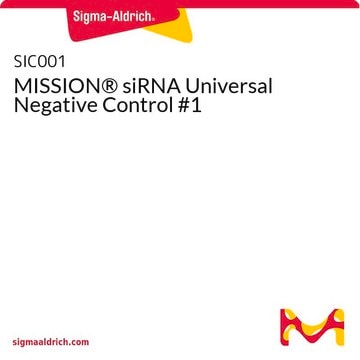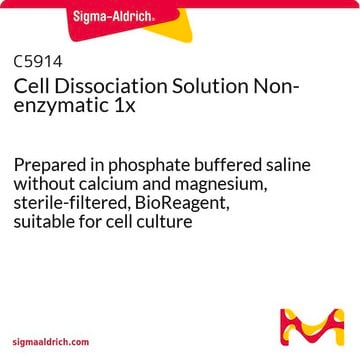SF006
ESGRO Complete Accutase
The ESGRO Complete Accutase is a cell detachment solution of proteolytic & collagenolytic enzymes, qualified for use for the detachment of mouse embryonic stem cells cultured in serum-free conditions with ESGRO Complete Clonal Grade Medium.
Synonyme(s) :
Stem Cell Tested Accutase
About This Item
Produits recommandés
Niveau de qualité
Forme
liquid
Fabricant/nom de marque
Chemicon®
Technique(s)
cell culture | stem cell: suitable
Entrée
sample type: mouse embryonic stem cell(s)
sample type induced pluripotent stem cell(s)
Conditions d'expédition
dry ice
Description générale
Application
1. Thaw Accutase® to room temperature.
2. Wash plate, flask or beads with sterile PBS.
3. Add Accutase to culture dish or flask using aseptic procedures at 10 mL per 75 cm2 surface area.
4. Return culture to 37°C incubator and allow cells to detach (5-10 minutes).
5. Count cells and passage as usual. No additional washes or enzyme inhibitors are required.
Forme physique
1X Accutase® enzymes in Dulbecco′s PBS containing 0.5 mM EDTA•4Na and 3 mg/L Phenol Red.
Stockage et stabilité
Informations légales
Code de la classe de stockage
12 - Non Combustible Liquids
Classe de danger pour l'eau (WGK)
WGK 1
Point d'éclair (°F)
Not applicable
Point d'éclair (°C)
Not applicable
Certificats d'analyse (COA)
Recherchez un Certificats d'analyse (COA) en saisissant le numéro de lot du produit. Les numéros de lot figurent sur l'étiquette du produit après les mots "Lot" ou "Batch".
Déjà en possession de ce produit ?
Retrouvez la documentation relative aux produits que vous avez récemment achetés dans la Bibliothèque de documents.
Les clients ont également consulté
Notre équipe de scientifiques dispose d'une expérience dans tous les secteurs de la recherche, notamment en sciences de la vie, science des matériaux, synthèse chimique, chromatographie, analyse et dans de nombreux autres domaines..
Contacter notre Service technique



![[Pd(OAc)2]3 reagent grade, 98%](/deepweb/assets/sigmaaldrich/product/structures/508/249/99a0ef2c-b77c-4d73-8ed9-0cca05b6b41f/640/99a0ef2c-b77c-4d73-8ed9-0cca05b6b41f.png)







